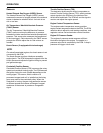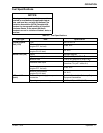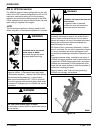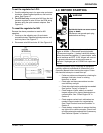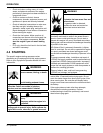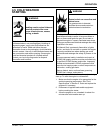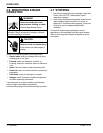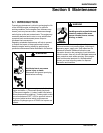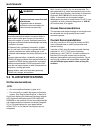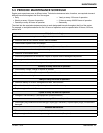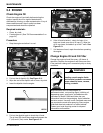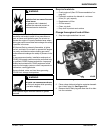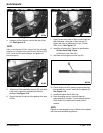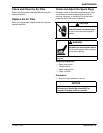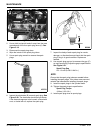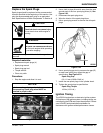
MAINTENANCE
24 Maintenance TP-6901 6/14
5.2 FLUID SPECIFICATIONS
Oil Recommendations
NOTE:
• Do not mix different brands or types of oil.
• Do not overfill or underfill the engine’s lubrication
system. See “Engine Specifications” in Section 8.
Use oil that displays the American Petroleum Institute
(API) Starbrust certification mark FOR GASOLINE
ENGINES on the container. Do not use straight-weight
oils recommended for industrial or stationary engines.
CC or CD classification oils, even when labeled
HEAVY DUTY or For Natural Gas Engines are not
acceptable.
Multi-viscosity synthetic oils are recommended. For
best performance in colder environments (such as the
United States and Canada), use Society of Automotive
Engineers (SAE) 5W-30, API service class SJ or
higher. In extremely hot environments where
temperatures are never or rarely below 0°C (32°F), use
a synthetic oil with a viscosity designation of 10W-30,
API service class SJ or higher.
Grease Recommendations
The alternator and starter bearings on this engine must
be lubricated with a high-quality lithium-based
automotive grease.
Coolant Recommendations
Use only a mixture of 50% long life coolant and 50%
clean, softened water to inhibit rust/corrosion and
prevent freezing.
A solution of 50% long life coolant provides freezing
protection to –37°C (–34°F) and overheating
protections to 149°C (300°F). A coolant solution with
less than 50% long life coolant may not provide
adequate freezing and overheating protection. Do not
mix long life coolants and conventional coolants. Do
not mix different types and/or colors of long life
coolants.
WARNING
!
Explosive fuel can cause fires and
severe burns.
If a gaseous odor is detected,
ventilate the area and contact an
authorized service technician.
LPG (Liquefied Petroleum Gas) is extremely
flammable and tends to settle in low areas where a
spark or flame could ignite the gas. Do not start or
operate this engine in a poorly ventilated area where
leaking gas could accumulate and endanger the safety
of persons in the area.
NG (Natural Gas) is extremely flammable, is lighter
than air, and rises. Do not start or operate this engine
in a poorly ventilated are where leaking gas could
accumulate and endanger the safety of persons in the
area.
To ensure personal safety, installation and repair of
LPG/NG fuel supply systems must be performed only
by qualified LPG/NG system technicians. Improperly
installed and maintained LPG/NG equipment could
cause the fuel supply system or other components to
malfunction, causing gas leaks.
Observe federal, state, and local laws governing
LPG/NG fuel, storage, and systems.



